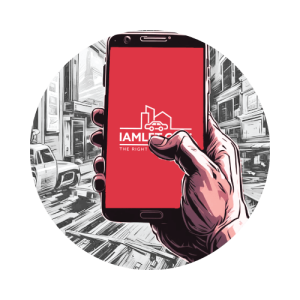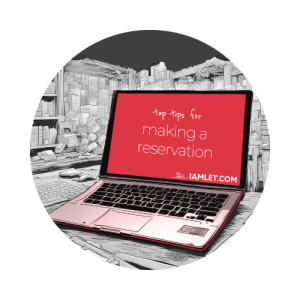IAMLET: Tips for booking accommodation
Information on Reservations and Bookings
Iamlet is a unique accommodation finder service that showcases and highlights a wide range of options and services for short and long-term stays in your desired area. Traditional booking services typically only show accommodation and room options that they directly manage or where accommodation providers have subscribed to that particular service. So, while on those platforms and looking in a specific area, you are often only presented with a small percentage of what is actually available. Iamlet aims to showcase as many accommodation providers as possible, regardless of the booking services they use, by offering both free and paid listing options and intuitive search facilities, all designed to help you quickly find what you are looking for and the links to the booking platforms to book or reserve them.
Once you have found your perfect accommodation, the next step is to protect yourself from potential issues or problems in the future. Alternatives to conventional lodging solutions can provide unique experiences and memories; however, dealing with smaller businesses or individuals can seem daunting for those who have little or no experience in booking with these types of providers. Before providing your information and handing over any money, it is always advisable to get clarification on what you are booking and what measures to follow to reduce or avoid fraud in the first place. Experienced and genuine accommodation providers understand the types of questions or concerns you might have and are happy to explain or provide the answers to any questions you might have. In this section, we will talk about the various tips and measures you should consider when making a booking or reservation.

- Never rush – you will always find the perfect place to stay for your trip. You may be looking at a particular listing, and given its popularity, you might feel a sudden sense of urgency. Your dates might be available, but there is a risk that they could be booked by someone else any day. The risk in this situation is that you might rush in and ignore the signs for fear of missing out. Many fraudsters rely on this fear, so you must follow your judgement and carry out the necessary checks before booking, even if it means losing your first choice, as it is better to face disappointment than to lose large amounts of money allocated for your holiday or vacation.
- Research the provider, not just the accommodation –ensure that the accommodation provider is genuine and is able to offer the services they are stating. Whether contacting them through the contact details they have provided on Iamet or by searching for them on other platforms, it is important to ensure you know you are speaking to a real person who is able to offer the advertised services. Most established providers will be on a number of platforms, and their contact information and details will be consistent across all of those platforms. If a provider is on only one or a small number of platforms or the contact information is not the same as other listed services, you might need to contact the owner and ask them to clarify or contact the owner on different platforms and ask them to validate that this profile belongs to them. Genuine accommodation providers will more often be happy to help and clarify.

- Validate the details – one sure way of being disappointed when booking any accommodation is not understanding what you are getting, what is included and what is not and the general state and upkeep of the facilities. Photographs from ten years ago or vague descriptions can be a recipe for problems down the road. Here are some areas to watch out for: –
- Photographs – establishing how old any advertised pictures used are and whether the accommodation still looks like the pictures. If the images are old, you could ask if the accommodation provider has new pictures available or if the accommodation has more wear and tear than the photographs fail to highlight, it could be a position to negotiate the price.
- Reviews – reading reviews left by guests who have previously stayed. Looking at their comments and how long ago someone stayed is a good indication and metric of the overall state and upkeep of the comment. Often, with reviews, it is also important to read into the tone and criticism; reviews can sometimes be used to punish accommodation providers, not always because of the facilities or amenities, but because the person booking assumed or did not have clarity when booking. If a new listing is in an area where they do not get many visitors, you could ask the accommodation provider for references, even if they would be happy to provide you with a walk-through of the property via a video call.
- Fees and what is included – no one likes surprises, so it is always good to understand what is and what is not included. If the accommodation provides access to a pool, are there restrictions? If you are staying in an apartment, will the cost include all bills, such as utilities and expenses? If so, are there caps or restrictions where a surcharge might be charged? When staying in traditional lodging, factors such as whether local taxes are included are charged separately from the nightly room charge. The fees and what might or might not be included will vary depending on the type of accommodation, local restrictions and the country in which the booking is made. The point is more about not assuming and asking for clarification if you are not sure.
- Amenities and Facilities – assumption can be a problem when it comes to accommodation; believing that things like all apartments have an iron or all hotel rooms come with tea and coffee-making facilities is a recipe for disappointment. For example, suppose you are staying in an apartment for over a month, and the building has laundry facilities. In that case, you may need to iron certain articles of clothing. If an iron is not stated in the description, it is probably worthwhile to confirm before booking. Also, think about safety: if the accommodation uses gas stoves and boilers, are there carbon monoxide and smoke detectors, fire distinguishers, etc.? Again, it is always worthwhile reaching out to the accommodation provider with any questions you might have.
- Check-in and Check-out times – what time can you access your chosen accommodation, and at what time would you be able to leave? Checking-in times are typically from mid-day or after three pm; however, if you have an early morning arrival, is there somewhere you could store your bags prior to check-in? What if you arrive late or during a holiday? Again, it is always worthwhile clarifying the particulars before booking as often, if check-in is at an unsociable time or during a holiday, a surcharge or fee might be charged.

- Making the booking – you have carried out all of your checks, you have established that the accommodation provider is genuine, and you are now ready to book; what comes next? Most accommodation providers will be listed on a range of booking platforms or services. Suppose you have established a relationship with the provider. In that case, they may even suggest that a discount could be offered if you book directly. Before making the reservations, let us look at some of the pros and cons.
- Deposit or full payment – many accommodation providers, depending on how soon your reservation is, will likely require a deposit, with the full payment being made upon arrival or at an agreed time before arrival. When making a deposit, you must have a clear agreement in place (in writing) and a list of the circumstances where you might lose your deposit. If you are instructed that full payment is required upfront, even if it is months in advance of when you might stay, you will need to insist on having something in writing. In nearly all cases, you will need to have an agreement in place outlining what happens if you cancel or make changes, and the amount of any amounts paid will be returned. In addition to the agreed payment, the way in which you pay and the payment method type are equally important.
- Platform or booking direct – Many accommodation providers will typically offer a range of booking options on various platforms or directly. If on a particular platform, what guarantees will you have should something go wrong? For example, the booking service Airbnb offers AirCover protection; if issues arise that cannot be resolved, they will step in and help you find a similar place or provide a full or partial refund. Other platforms offer similar guarantees, such as VRBO’s travel with confidence. If booking directly with the accommodation provider, are they a business or organisation? And what payment methods do they offer? If they are an individual and the only available payment method is a bank transfer to a country different from your own, you might have limited options to recover some or all of your money if something goes wrong.
- Insurance – whenever you travel, especially overseas, you will often be required to purchase travel insurance. Travel insurance protects you should unforeseen events take place, such as illness or force of nature and will cover part or all of any money you pay prior to your trip. When booking alternative lodging, it is always advisable to clarify within your policy whether this type of accommodation is covered and the circumstances where it pays out should the worst occur. For example, standard travel insurance will typically not include cruise trips, and most will not cover you for extended stays of more than 20 days; in those situations, you would need to obtain travel insurance specific to your travel plans.
- Payment methods – the way in which you pay can also make a big difference. Whether by bank transfer, debit or credit cards, all have associated risks. Bank transfers are more problematic as once a request for transfer takes place, the money normally clears your account within a few days. Suppose a problem occurs or the transfer is identified as fraudulent because the funds are no longer in your account. In that case, you are reliant on your bank to help recover the funds. If you knowingly made the transfer, it is likely you would have to contact the local police and hope they might be able to recover any funds. Debit cards work similarly to bank transfers, as the money being transferred comes directly from your bank or checking account. Credit cards relate to money borrowed or issued by a financial organisation. Funds are not always immediately transferred and can take up to 30 days to be transferred, which means that if you identify a fraudulent payment, your credit card provider might be able to stop or recover funds quickly and easily. Again, like with banks, if you initiate and knowingly make a payment request, the credit card company may still not step in and instruct you to recover the funds by contacting the supplier yourself directly. In reality, all payment methods and means have flaws, which is why booking platforms as a method of payment have become a popular choice. If you know your money is protected and that trusted and well-known booking services make guarantees, then should the worst case occur, you will recover most, if not all, of your money.

- Maintain a relationship – this does not necessarily mean messaging all the time, but as you get close to your arrival date (at least one or two weeks before), it is advisable to send a message to your accommodation provider to make sure everything is set for your arrival. If, for example, they were waiting on something from you, they have double-booked, or some other problem has come up, by contacting them in advance, you will be in a position to make alternative arrangements rather than turning up and facing disappointment. Examples of when you might message include clarifying arrival times, checking that everything is set and prepared for your arrival, and ensuring that all monies have been received.
- Legal agreements, house rules and surcharges – Most accommodation providers will provide some form of legal agreement that outlines the terms and conditions of your stay. You must read through the agreement and understand the fine print. Legal contracts are not always easy to understand, but pay particular attention to phrases and terms like failing to, exceptions, exclusions, surcharges, and additions. Most legal contracts are relatively straightforward and standard, with most of the clauses and exceptions reasonable; however, nothing must come as a surprise. If you want to plan, it might be possible to ask the accommodation provider for a standard legal contract, meaning their details and your name are not part of the contract, so that you can read it ahead of your arrival. It is also important to understand any house rules, something that you should make anyone else accompanying you aware of, as house rules are often part of the terms and conditions. Failure to follow the rules, such as no parties and not permitting non-pre-approved people to stay at the accommodation, could result in problems. Lastly, to understand the situations and circumstances in which surcharges or additional payments might be required. For example, likely cost of breakages, excessive use of service, above agreed expectations, etc.
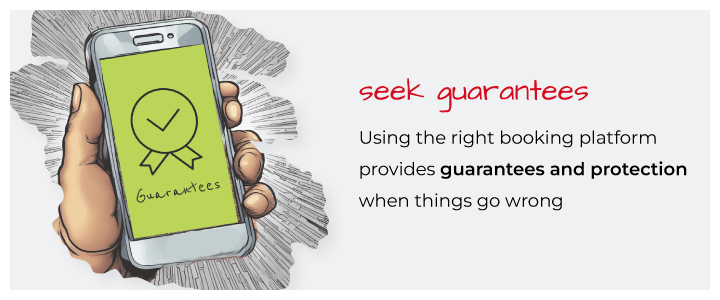
- Methods of Communication – ideally, before your arrival, it is important to establish how you can communicate with the accommodation provider while in the country or area. Is there a preferred method of communication? What are the times or periods during which they might not be available during the day? Probably, there will be response times, and lastly, who to contact during an emergency. Many of the major booking platforms provide a recorded messaging service. If using other methods, such as instant messaging or emails, make sure you take screenshots or copies of any agreements or issues raised.
- Avoid assumptions – depending on the type of accommodation booked; people often expect hotel-like services when booking private accommodation directly with their owners. Ask for clarity with regard to whether tea and coffee, toilet paper and paper towels, and everyday essentials such as soap and shampoo are provided. In addition, clarify whether those types of services and amenities are provided as well as whether they are free and you are not required to replace them. It is always best to avoid assumptions and ask for clarification.
- Establish usage allowances – if the internet and telephone are provided, it is always advisable to establish any restrictions or limitations. For example, if you use a streaming service and the internet has a download limit, it is advisable to understand any restrictions and surcharges before using. With telephones, when are calls charged? For example, in some countries, local calls to certain numbers are charged free. With energy costs rising, some accommodation providers have placed limits on electricity usage, especially when air conditioning or fans are available. These measures are put in place to stop people from leaving air conditioning and fans on when they are not present. Always establish the average cost, what the surcharge would likely be and how excessive usage is calculated.
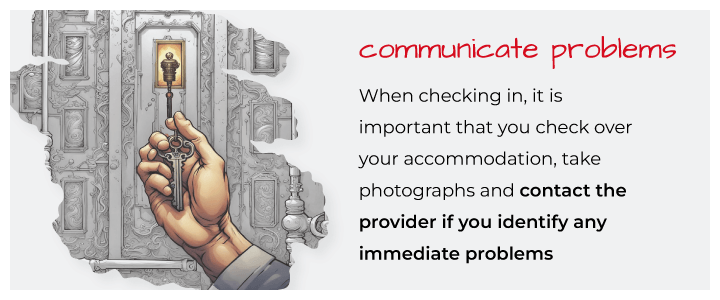
- Checking-in – the day has finally arrived, and you have arrived at your chosen destination. Now that you are here, you should have received instructions on what to do and where to go in order to check-in.
- Identification – some accommodation providers may require you to provide identification, such as access to your passport or ID. Make sure you clarify what forms of identification are acceptable, as some countries may insist on using passports only if travelling overseas.
- Walk-through – when inside the accommodation, it is always important to carry out a walk-through with the agent or on your own (if self-check-in), making sure everything is present and working correctly, including any passwords for WIFI, safes, etc. If you find something missing or not working, you should contact the accommodation provider immediately. Take day one photographs, especially of any problem areas, stains, missing and broken items and equipment, to avoid any problems when checking out.
- Housekeeping and cleaning – if housekeeping was a service provided as part of the overall cost, it is important to establish how often the person will be coming to clean your accommodation, whether it will be the same person, and what the expectations are for when you leave. For example, many accommodation providers include an exit cleaning charge included within the cost.
- Learning about the amenities – if your accommodation provides access to certain amenities and services, it is worthwhile establishing how you can use and access them on day one. If your building has a laundry facility, do you need to purchase tokens? Where can you buy them? If you have access to a gym or swimming pool, how can you access it? As well as any rules and restrictions.
- Reporting problems – throughout your stay, it is important to inform the accommodation provider of any problems or issues, no matter how big or small. Suppose small items such as cups and plates break. In that case, it is worthwhile contacting the provider ahead of your departure to establish if charges will apply or if you can purchase a replacement. Reporting issues is not just limited to the facilities within the accommodation; you should also notify them of external issues or problems, such as noise problems, issues within building staff, etc, as the provider may want to step in to resolve the situation. Whenever problems occur, again, take photographs and screenshots of when you and the accommodation provider have agreed to certain conditions and solutions.

- Getting to know the area – before arrival, it is always worthwhile researching where you are staying and what is around you. Reading online reviews of your particular accommodation can be extremely useful, as past guests might provide insight and useful tips relating to the local area. When checking in, if dealing with an agent, ask them for advice and tips. Depending on the duration of your stay, you will likely need to establish places to eat, where you can buy groceries and how to get around. Many countries now only offer cash-less public transport options, so establishing how to obtain a transport card and the apps used for local taxis can be extremely helpful.
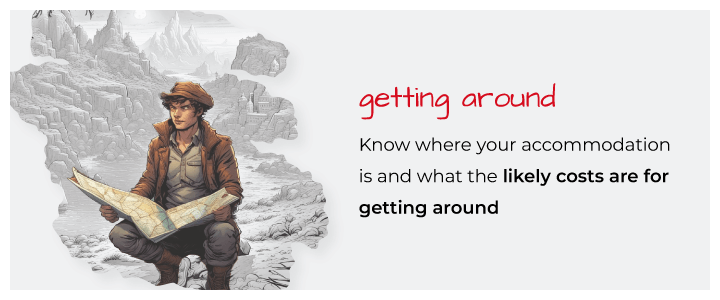
- Checking out – you have hopefully had an enjoyable trip, and it is now time to check out.
- Check-out time – If you have a late flight, it might be possible to stay in the accommodation past the official check-out time. When booking, it is always worthwhile asking the question to agree on a time upfront. If you are checking out and have a short time before you need to leave for the airport, it might be worthwhile requesting an earlier check-out time. If something comes up, you want to make sure you have time to resolve it before departing.
- Walk-through – if the accommodation provider or agent carries out a face-to-face checking out service, make sure you do a quick walk-through of the property, showing how everything is as expected, in working order, etc.., and anything that you have highlighted throughout your stay. Again, if problems have occurred, take photographs just until you leave, in case there are any problems in terms of the deposit being returned.
- Conversion rate – if you have agreed on any charges, especially if in a currency different to your own or the currency you paid for the deposit, establish the conversion rate used in any amounts quoted. Even though the interbank rate is higher, services such as xe.com can provide a spot rate, which can be used as a guide.
- Do not forget the deposit – make sure you establish when the deposit will be returned and any amounts that have been deducted, which should have been pre-agreed. If surcharges have been charged, ask to see receipts to ensure that you are not being overcharged. If the deposit is handed back in cash, count it and make sure it is all there and is as expected. If the money is held or being transferred by the bank, establish the timeframe for it being returned.
- Reviews and comments – It is always worthwhile to take time to provide an accurate and honest review of your stay. Suppose you had experienced problems or issues during your stay. In that case, they should have been previously highlighted to the accommodation provider, who should have been given an opportunity and a reasonable amount of time to resolve them. During your stay, you have likely explored the area and familiarised yourself with all of the services and amenities; it can be extremely helpful for future guests to share your tips and experiences. Fairness and honesty are key if you want others to take your comments and suggestions seriously, avoiding personal views and opinions based on feelings rather than facts wherever possible.


